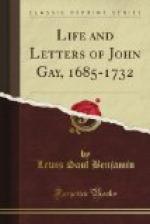Of course, if “The Beggar’s Opera” is taken as irony, there is really nothing at all to be said against it; but the majority of any audience do not understand irony, and to many the whole thing seemed vicious, an approval of vice, and even an incitement to wrong-doing. Dr. Herring, afterwards Archbishop of Canterbury, preached against the Opera in, it is said, Lincoln’s Inn Chapel, and censured it as giving encouragement not only to vice but to crimes, by making a highwayman the hero and dismissing him at last unpunished. In the Preface to Dr. Herring’s “Sermons,” it is added that “several street-robbers confessed in Newgate that they raised their courage at the playhouse by the songs of Macheath."[8] Others certainly shared the views of the clergyman. When on September 15th, 1773, at the Old Bailey, fifteen prisoners were sentenced to death, forty to transportation, and eight to a whipping, it is recorded that the magistrate, Sir John Fielding, “informed the Bench of Justices that he had last year written to Mr. Garrick concerning the impropriety of performing ‘The Beggar’s Opera,’ which never was represented without creating an additional number of real thieves,"[9] and that to this effect he not only wrote to Garrick at Drury Lane Theatre, but also to Colman at Covent Garden Theatre. “Mr. Colman’s compliments to Sir John Fielding,” the latter replied, “he does not think his the only house in Bow Street where thieves are hardened and encouraged, and will persist in offering the representation of that admirable satire, ‘The Beggar’s Opera.’"[10] Sir John Hawkins, Chairman of the Middlesex Bench of Justices, also held the view that the Opera was harmful, and in 1776, wrote: “Rapine and violence have been gradually increasing since its first representation."[11] Dr. Johnson took a saner view, and one that was subsequently supported by Sir Walter Scott, and is generally accepted to-day. “Both these decisions are surely exaggerated,” he wrote in reference to the opinions expressed by Swift and Dr. Herring. “The play, like many others, was plainly written only to divert, without any moral purpose, and is therefore likely to do good; nor can it be conceived, without more speculation than life requires or admits, to be productive of much wit. Highwaymen and housebreakers seldom frequent the playhouse or mingle in any elegant diversion; nor is it possible for anyone to imagine that he may rob as safely because he sees Macheath reprieved upon the stage."[12] And again, he said: “I do not believe that any man was ever made a rogue by being present at its representation. At the same time I do not deny that it may have some influence by making the character of a rogue familiar and in some degree pleasing."[13]
The success of the piece was immense, and its vogue tremendous. “The famous ‘Beggar’s Opera’ appeared upon the stage early in the ensuing season; and was received with greater applause than was ever known: besides being acted in London sixty-three nights without interruption, and renewed the next season with equal applause, it spread into all the great towns of England; was played in many places to the thirtieth and fortieth time; and at Bath and Bristol fifty times,” wrote the anonymous editor of the 1760 edition of Gay’s plays.




